MercoPress. South Atlantic News Agency
Argentine peso plummets and central bank raises interest rate to 60%
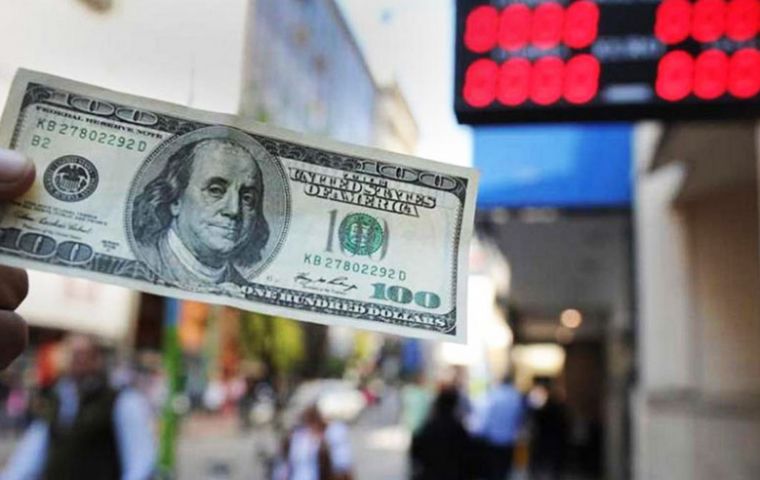 As the US dollar on Thursday trading rapidly climbed from Wednesday's 34 Pesos to over 36 Pesos, the Central bank raised its benchmark interest rate to 60%
As the US dollar on Thursday trading rapidly climbed from Wednesday's 34 Pesos to over 36 Pesos, the Central bank raised its benchmark interest rate to 60% 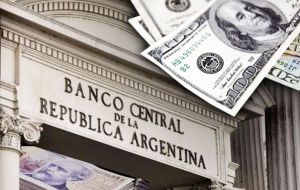 The central bank then announced that fifteen minutes before the end of the market's foreign exchange trading it would auction US$ 500 million
The central bank then announced that fifteen minutes before the end of the market's foreign exchange trading it would auction US$ 500 million 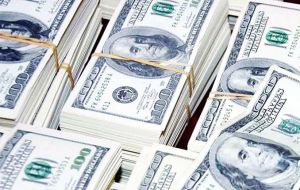 The market absorbed some US$ 330 million at an average price for the dollar of 38,71 Pesos. Overall forex trading on Thursday reached US$ 748 million
The market absorbed some US$ 330 million at an average price for the dollar of 38,71 Pesos. Overall forex trading on Thursday reached US$ 748 million 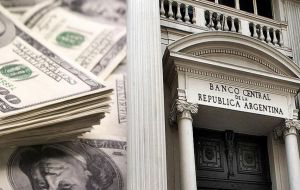 This means the central bank has sold US$ 1.040 billion in reserves so far this week, US$ 2.076 billion in the month and US$ 13.511 billion since the beginning of 2018
This means the central bank has sold US$ 1.040 billion in reserves so far this week, US$ 2.076 billion in the month and US$ 13.511 billion since the beginning of 2018 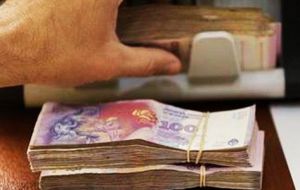 The Peso has devalued 42% in August; 94% since April when the current turmoil took off and 110.4% this year.
The Peso has devalued 42% in August; 94% since April when the current turmoil took off and 110.4% this year. The Argentine Peso plummeted 15.6% to a new record on Thursday, and ended trading at 39.87 after having reached almost 42 Pesos to the US dollar in mid afternoon. This follows on the Wednesday which also witnessed the Argentine currency slide 7% to the greenback.
Lack of investors' confidence in the current Argentine government policies and mistrust from the locals multiplied the demand for the US dollar, the natural longstanding refuge for Argentines whenever they feel turmoil in the air. The run intensified when the government of president Mauricio Macri confirmed all members of the cabinet.
As the US dollar on Thursday trading rapidly climbed from Wednesday's 34 Pesos to over 36 Pesos, the Central bank raised its benchmark interest rate to 60% from 45% in a bid to control the market and the confusion.
The central bank issued a statement saying it called a special meeting of its monetary policy committee, which voted unanimously to hike its key interest rate “in response to the foreign exchange rate situation and the risk of greater inflation.” It also forced banks to increase their reserve levels 5%.
The decision seemed to cool the market's anxiety, but soon it was back again in a rush to buy US dollars and dump Argentine Pesos.
The central bank then announced that fifteen minutes before the end of the market's foreign exchange trading it would auction US$ 500 million, which in effect helped the market to close below the 40 Pesos benchmark, at 39.87.
The market absorbed some US$ 330 million at an average price for the dollar of 38,71 Pesos. Overall forex trading on Thursday reached US$ 748 million
This means that the Argentine central bank has sold US$ 1.040 billion in reserves so far this week, US$ 2.076 billion in the month and US$ 13.511 billion since the beginning of 2018.
The Peso has devalued 42% in August; 94% since April when the current turmoil took off and 110.4% this year.
Thursday's tumult, at times almost panic, came a day after the International Monetary Fund expressed support for Argentina and its decision, earlier this year, to support the country with a US$ 50bn standby financing deal, and to review deal clauses given new international market conditions.
“In consideration of the more adverse international market conditions, which had not been fully anticipated in the original program with Argentina, the authorities will be working to revise the government’s economic plan with a focus on better insulating Argentina from the recent shifts in global financial markets, including through stronger monetary and fiscal policies and a deepening of efforts to support the most vulnerable in society“, said IMF chief Christine Lagarde in a brief statement.
“I am confident that the strong commitment and determination of the Argentine authorities will be critical in steering Argentina through the current difficult circumstances and will ultimately strengthen the economy for the benefit of all Argentines.”
Previous to the Wednesday IMF announcement President Macri had addressed the nation in an attempt to contain the situation, but it caused the opposite reaction.
“We have agreed with the International Monetary Fund to advance all the necessary funds to guarantee compliance with the financial program next year,” Mr. Macri said in the televised address on Wednesday. “This decision aims to eliminate any uncertainty.”
“Over the last week we have seen new expressions of lack of confidence in the markets, specifically over our financing capacity in 2019”
As part of the deal, Argentina’s government pledged to speed up plans to reduce the fiscal deficit. But given the peso’s continued depreciation, which makes the country’s dollar-denominated debts more expensive to pay, investors are increasingly concerned that the IMF help may not be enough.
Argentina has US$ 24.9 billion in peso- and foreign currency-denominated debt payments due next year, according to official data.
The peso’s decline has contributed to a jump in inflation, which hit a 12-month rate of 31.2% in July.
This scenario with the budget cuts promised to the IMF that will slow down public works projects, is contributing to a recession that will result in an economic contraction of 1% this year, according to the government. That could hurt Mr. Macri’s re-election prospects in next year’s presidential race.
Reacting to the situation Argentina’s biggest labor group, the CGT, said on Wednesday it will call a 24-hour general strike on September 25th to protest Macri’s belt-tightening measures. Two smaller union groupings said they will go on a 36-hour strike on September 24th to protest the IMF, which many blame for the 2002 crisis.
From New York, Bernardo Delgado, director of global markets for Société Generale said the Argentine economy could tank and ”if Argentina goes into recession the outlook for Macri’s reelection bid does not look very good. I respect the central bank and the finance ministry and Macri, but they have made some mistakes, and we are running out of time.” Argentina’s general election is on October 27, 2019.




Top Comments
Disclaimer & comment rules-

-

-

Read all commentsGood thing CFK isn't in power, Macri won't even dream about invading the Falklands as a distraction.
Sep 02nd, 2018 - 04:41 am +2chronic i.e pathological
Aug 31st, 2018 - 12:16 pm 0Glad to see you got your two cents worth.
Manchurian Candidate's betrayal's time of reckoning is fast approaching.
Reekie,
Sep 05th, 2018 - 06:18 pm 0“Where are now the Macri cheerleaders? All gone or in hiding.”
I would not describe myself as a Macri cheerleader because he has made mistakes, but I am definitely anti-Kirchner and I am still here.
“Developed capitalist countries have at least built their economies with decision makers with the country’s interests at heart – not so in Argentina.”
Including CFK, of course. She did become unusually rich-hence the current investigations.
“After the end of their term, investigations should start to check whether their erratic and inconsistent behaviour controlling the peso’s value unduly facilitated huge profits to banks and financiers.”
Why wait until the end of a term? Start an investigation as soon as any dodgy behaviour is suspected. I'd include in that an investigation into who is selling these millions of pesos that are bringing the peso down in value. I've read that the majority of the transactions have been for US2m from banks with Kirchnerist management. Is this true? I have no idea, but I'd definitely support an investigation.
Now, 1. Who might have access to a sufficiently large amount of pesos that its sale could influence the country's exchange rate? 2. Who might have leverage over banks to ask them to make these transactions? and 3. In whose political interest would it be for the peso to collapse under the current government? The answer to all 3 is CFK. Not proof, but maybe suspicious and investigations should start.
Commenting for this story is now closed.
If you have a Facebook account, become a fan and comment on our Facebook Page!